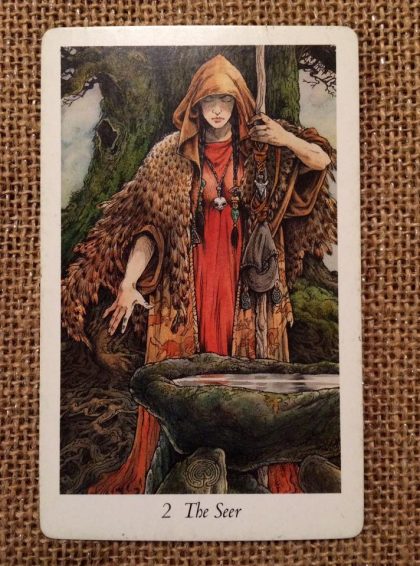Lughnasa and the Cheshbon Nefesh Moon
 Shabbat gratefuls: Lighting the candles. Gathering in the light. A day for friends, family, naps, and learning. Shadow mornings. Kisses. Training. Outside, Inside. Food. Re’eh. Parsha today. Rain, steady. Artemis. Between 65 and 85 degrees. Tomatoes fruiting. Kale Leaves. Spinach. Beet Roots expanding. Luke and Leo visiting.
Shabbat gratefuls: Lighting the candles. Gathering in the light. A day for friends, family, naps, and learning. Shadow mornings. Kisses. Training. Outside, Inside. Food. Re’eh. Parsha today. Rain, steady. Artemis. Between 65 and 85 degrees. Tomatoes fruiting. Kale Leaves. Spinach. Beet Roots expanding. Luke and Leo visiting.
Sparks of Joy and Awe: Lighting the Candles
Year Kavannah: Wu Wei
Week Kavannah: Rodef Shalom. The desire to generate well-being for ourselves and others.
Tarot: The Seer, #2 “The Seer represents potential and things not yet made manifest. This is a time for quiet, solitary reflection and listening to your inner voice rather than taking action.” Gemini (a good Shabbat card)
One brief shining: Alan sat at our usual place in the Dandelion, face drawn, his usual high personal energy muted; last week he canceled, a cold he said, but looking at him I knew what it was. Covid.
Covid: Alan had tested negative since Wednesday while Cheri still suffered. Covid has not left the house. I’m confident a Department of Health and Human Services war against vaccines will be greeted with good cheer in Covid dining halls. Here’s to RFK, those viruses must say, as they lift a glass to that vacuous ass.
Brought all those Covid times back. Especially Mary, only now a permanent resident of Australia, finally settled in Melbourne. And Seoah. Who ended up here for a few months, then onto two weeks of quarantine in Singapore. Kate, who never saw the end of the pandemic.
That one visit Seoah and I made to Safeway. Empty produce shelves. A staff person (essential workers, remember?) handing out one dozen eggs per customer. How wary we all were of each other.
I pick-up my groceries rather than shop for them myself. Crowds bother me. Enclosed spaces with lots of people, too. Covid boosted my natural introversion, a different, but valid rationale to stay home, see only friends and family.
Just a moment: I’m reading, so you don’t have to, Conservatism, by Yoram Hazony. This text by an orthodox Jew who lives and teaches in Israel lies behind Project 2025 and JD Vance’s politics.
In it Hazony argues for what he calls national conservatism. He writes well, a clear prose outlining ideas that guide policy (what there is of it) in the red tie guy’s administration.
National conservatism has, according to Hazony, five main principles:
- Historical empiricism
- Nationalism
- Religion
- Limited Executive Power
- Individual Freedom
Hazony, Conservatism, p. 33-34
This morning we’ll examine historical empiricism. “The authority of government derives from constitutional traditions known, through long historical experience of a given nation, to offer stability, well-being, and freedom.” op cit, p. 33
As you can see from this definition, conservatism bases its rationale for governance on what Hazony insists on calling historical empiricism. I say insists because whatever falls outside of that purview just doesn’t count. Hazony has no problem with that since taking the path laid down by a people and their constitution will (I would say might) produce the key conservative virtues of stability, well-being, and freedom. Stability and order being the key to conservative fealty to the past.
I understand the desire to maintain a certain degree of order and stability in a state. Without order life can sink into chaos. Look at any failed state for the consequences: South Sudan, Congo, El Salvador, Venezuela.
Yet to get that stability by genuflecting to the ways of history leaves out key realities. The role of women, for instance. What to do with LGBT folks. How about the disabled?
Hazony agrees that it would be blind and stupid not to oppose slavery even though it has historical precedence on its side. He seems to think, however, that the case for other groups must remain unheard.
This is, to me, a fundamental flaw and one reason I reject his whole project out of hand. National conservativism appears willing to close off its fifth principle, Individual Freedom, in obeisance to the first.
